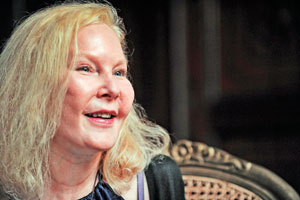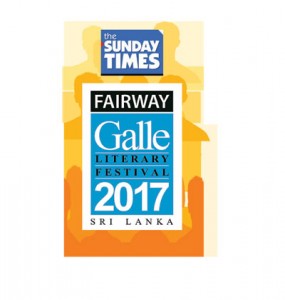Giving body and soul to poverty
View(s):
Pulitzer Prize winner Katherine Boo who attended the Fairway Galle Literary Festival talks to Smriti Daniel about the challenges she faced both mentally and physically in writing about poor communitiesKatherine Boo in Galle. Pic by Amila Gamage
Let it keep, the moment when Katherine Boo found herself lying on the floor with a punctured lung and three broken ribs in a spreading pool of Diet Dr. Pepper. Rewind, see her tripping over the unabridged dictionary, her body breaking as it met the floor. Keep rewinding, back over a decade to the beginnings of her career as a journalist, when Behind the Beautiful Forevers, a book that would cement her reputation and win her a National Book Award for Nonfiction, was still unwritten; the thought yet to cross her mind.
It was in 1993 when Boo interviewed Al Gore. After stints at the Washington’s City Paper and the Washington Monthly, Boo had joined the Washington Post, where she would remain till 2003. Boo’s literary, almost cinematic style (which I couldn’t resist giving a nod to in the opening of this story) was in full evidence even then. She was writing about a man she described as the most perfect flower of America’s political culture. Boo herself was full of promise, her editors told her – but only if she would write about the right things. In one word, politics.
But Boo found it easy to say no, her conviction arising from the belief that some of the things she wanted to write about should be front and centre in the headlines, and that they could be, if written well.
She set out to do so, evolving over a period of years a style that was uniquely her own. Boo wrote about how budgets were allocated for parks in Washington DC’s poorest neighbourhoods, and she joined the displaced in the shelters of Katrina-ravaged Louisiana. Her 1999 series for the Washington Post about the appalling conditions in group homes for intellectually disabled people won the Pulitzer Prize for Public Service and spurred official reforms.
Key was how she saw these communities, something reflected in the language she uses. “The words we use to describe poverty are static –“stuck”,“trapped” – but the actual experience of it is incredibly volatile,” Boo told the Sunday Times in Galle, where she was a speaker at the Fairway Galle Literary Festival. Sitting opposite her throughout our interview was the man who introduced her to India – her husband, the political historian and writer Sunil Khilnani.
Boo nods at him when she confesses that despite her passion for a certain kind of reporting, she was dogged by self-doubt. “He knows it is constant, and that there are often tears.” But Boo always powered through to write stories that were about individual lives but still succeeded in opening up a space for deliberation about important, often global issues. The relentless self-scrutiny only made her work harder. It also helped her walk away from what would have been her first book.
She had spent seven years reporting on families in one of the poorest communities in Washington DC. Boo wrote a piece in the New Yorker around the same time that she sold the publishing rights to the book about them. But her magazine piece changed everything – “People came out of the woodwork to give the families money. To take them out of their public schools and put them in fancy private schools. HBO came in and bought the life rights. Suddenly these people were on Oprah. Warren Buffet and his family were helping out.” Boo watched lives transform but she knew this was no longer the story she wanted to write.
“It suddenly became a story about the weirdness of American philanthropy and not a story that had any relevance to the institutional failures that were creating stunting in the inner city. It didn’t have a meaning to the vast majority of poor people who don’t get invited onto Oprah to talk about their situation,” she says.
When Boo met Khilnani, and they began spending part of their time in Mumbai, the journalist found herself curious about low-income communities there. Her driving question was how rapid global development was affecting historically poor communities, and that was something relevant not only in India but all over the world. It was a question that would take a book to answer.
But slums like Annawadi were akin to an obstacle course for the journalist, who had at age 18 been diagnosed with an auto-immune disease. People were dying of tuberculosis in the slum, and a lake bordering the settlement was a nauseating blend of dumped petrochemicals and sewage – but it wasn’t those things that bothered her particularly. Boo’s health crisis could be debilitating, even walking was sometimes a challenge.
But when she had that accident in her own home, she decided that she would do what she had always done, pursue the reporting project that she was deeply passionate about and let her health look after itself.
Some of her commitment to telling this particular story came from her own childhood. Her mother grew up poor in Minnesota in the 1930s, and their family knew well what it meant to live a financially precarious life. Boo’s illness too played a role. She knew that to be disabled could stack the odds against you in all kinds of ways. “There is a real association between physical disability and mental disability – people assume that if you have this kind of disadvantage that you are weak of mind, it is a really pernicious conflation,” she says.
In her working life, it meant people – including policemen and judges – didn’t expect her to be capable of reporting the stories she was covering. “It used to really bother me, people would say things in front of me as if I couldn’t hear,” but in Annawadi Boo found ways to turn this to her advantage.
Before Boo found her most committed translator, an Indian woman named Unnati Tripathi, she would wander into Annawadi by herself. Filming people and trailing them as they went about their days. When journalists would later ask the community when they began to trust Boo, many would point to that time when she went into their midst alone.
Boo spent nearly four years in Annawadi. And over that time she got to know these families, and to care deeply about what happened to them. Though she worked hard to remain an observer, she sometimes had no choice but to intervene.
There was the time a woman was dragged out by her hair by a group of men, and Boo, convinced there was the danger of rape, stepped forward. “When I intervene in a situation like that I don’t feel like I have power – I am a small woman with a camera. You don’t know how it’s going to go, but you do know what you have to do in those moments,” she says. The gamble paid off, and the men retreated.
At other times, like when Fatima was fighting for her life in a hospital, Boo was less certain about her role. She thought the burn victim should be treated in a better hospital, but Fatima’s husband disagreed. Boo chose to honour his wishes, and she’ll never know if Fatima’s death could have been prevented if they had had her moved. In other ways too, Boo’s time in Annawadi was grim. Some of the children died, one by her own hand; families fell further into poverty; the justice system chewed people up and spat them out.
She saw how despite their tremendous resourcefulness, someone like the young garbage-sorter Abdul could lose everything in a moment. Boo documented all of this, because she felt that these stories were saying something about the workings of the public hospitals, and the criminal justice system, about the nature of poverty and corruption in modern India, that needed to be told. She stood witness, but that too had a price: “Crazy, terrible things are happening inside you, it eats you alive,” she remembers.
With her book she would eventually create something that had the literary quality of a novel, driven by human interest, not bogged down in historical detail or visibly skewed by the author’s presence. Readers were privy to the thoughts, the quietest reflections of the people in the book, arrived at by a painstaking, time consuming series of interviews and conversations. It meant we would read, simply, because we cared about what happened to Abdul and the others like Asha, Sunil and Manju.
Though the book offers no happy endings, ties up no loose ends, Boo does have some good news to report. Amid all the heartbreak, some things have gone right. The profits from Behind the Beautiful Forevers were shared with the community and the book brought politicians and journalists crowding in to Annawadi. And for those readers who care about Abdul still, an update: he has his own home, and a wife he is happy with. He says he always wanted a woman who would not mind that he smelled, and is glad to have found one.


